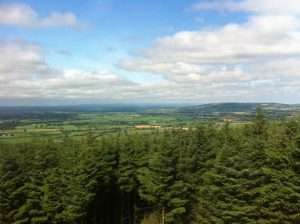It is JB Keane time again in this week’s Leinster Express. The judge in the district court sitting in Portlaoise refused jurisdiction over a case, telling the defence solicitor that the matter was too serious to be handled by the district court and must be passed to the circuit court, where any sentence passed might be more severe than at district court level. The case involved a dispute between two farmers over land, one had attacked the other with a pitchfork, puncturing his hand and his arm with the prongs of the fork. The incident had included the smashing of the window of the cab of a tractor, which seemed to have caused further injury to the victim.
It is a familiar story. Anyone who lives in rural Ireland will be able to recount a range of such stories. A person from a farm near Keane’s home town of Listowel can recount the story of the man who was the inspiration for Keane’s character “The Bull McCabe;” can recount how everyone from the neighbouring townlands knew of the man’s guilt; can recall that the man derived little pleasure from “the field,” for two years later, he died from natural causes.
Land disputes continue to be the most bitter of all. An auction last year, where one man outbid another man, to whose farm an eight acre field adjoined, paying an excessive price for a small piece of grazing land, not only attracted comment in the auctions report of the Irish Farmers Journal, but also caused a rift in a small church community, to the extent that the man who won the auction now sits in another church on a Sunday morning. All attempts at reconciliation having failed, there is a reluctant acceptance that there is something visceral in these disagreements; that these disputes are not amenable to any appeal to Christian theology, and are certainly not amenable to reason.
Were it the case that the desire for the land was rooted in a deep sense of being from a dispossessed people, then there might be some explanation for it. It might explain the case reported this week. But such an explanation would not account for the hunger for land among some whose families arrived with the plantation of Ireland, those whose forebears peopled the good farmland of King’s and Queen’s Counties. There must be something much deeper in psyche of some people, something deep in the hearts of some men, that creates a desire to have the land at all costs.
